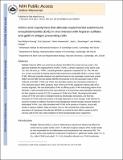| dc.contributor.author | Koenig, Paul-Albert | |
| dc.contributor.author | Spooner, Eric | |
| dc.contributor.author | Kawamoto, Norio | |
| dc.contributor.author | Strominger, Jack L. | |
| dc.contributor.author | Ploegh, Hidde | |
| dc.date.accessioned | 2017-05-26T18:46:34Z | |
| dc.date.available | 2017-05-26T18:46:34Z | |
| dc.date.issued | 2013-07 | |
| dc.identifier.issn | 0022-1767 | |
| dc.identifier.issn | 1550-6606 | |
| dc.identifier.uri | http://hdl.handle.net/1721.1/109387 | |
| dc.description | available in PMC 2014 July 01 | en_US |
| dc.description.abstract | Multiple sclerosis (MS) is an autoimmune disease that affects the CNS. One approved treatment for relapsing forms of MS is YEAK, a random copolymer of the amino acids tyrosine, glutamic acid, alanine, and lysine. YFAK, a second-generation copolymer composed of tyrosine, phenylalanine, alanine, and lysine, is more successful in treating experimental autoimmune encephalomyelitis, a mouse model of MS. Although originally designed and optimized based on the autoantigen myelin basic protein (MBP) and the MBP-derived peptide MBP85-99 presented to the MS-associated class II MHC molecule HLA-DR2, YEAK and YFAK also stimulate cytokine and chemokine production in APCs that lack class II MHC products. How YEAK and YFAK copolymers interact with APCs remains enigmatic. We used biotinylated YFAK to affinity-purify YFAK-interacting proteins from RAW264.7 cells and tested APCs from mice deficient in several of the newly identified interactors for their capacity to secrete CCL22 in response to YEAK and YFAK. We propose that initial contact of YFAK with cells is mediated mainly by electrostatic interactions, and find that interaction of YFAK with host proteins is strongly dependent on ionic strength. Cells deficient in enzymes involved in sulfation of proteins and proteoglycans showed strongly reduced binding of biotinylated YFAK. Lastly, cells stimulated with YFAK in the presence of heparin, structurally similar to heparan sulfates, failed to produce CCL22. We conclude that charge-dependent interactions of copolymers that alleviate MS/experimental autoimmune encephalomyelitis are critical for their effects exerted on APCs and may well be the main initial mediators of these therapeutically active copolymers. | en_US |
| dc.description.sponsorship | National Institutes of Health (U.S.) (NIH grant no. RO1 AI087879) | en_US |
| dc.description.sponsorship | National Institutes of Health (U.S.) (NIH grant AI049524) | en_US |
| dc.language.iso | en_US | |
| dc.publisher | American Association of Immunologists, Inc. | en_US |
| dc.relation.isversionof | http://dx.doi.org/10.4049/jimmunol.1300345 | en_US |
| dc.rights | Creative Commons Attribution-Noncommercial-Share Alike | en_US |
| dc.rights.uri | http://creativecommons.org/licenses/by-nc-sa/4.0/ | en_US |
| dc.source | PMC | en_US |
| dc.title | Amino Acid Copolymers That Alleviate Experimental Autoimmune Encephalomyelitis In Vivo Interact with Heparan Sulfates and Glycoprotein 96 in APCs | en_US |
| dc.type | Article | en_US |
| dc.identifier.citation | Koenig, Paul-Albert, Eric Spooner, Norio Kawamoto, Jack L. Strominger, and Hidde L. Ploegh. “Amino Acid Copolymers That Alleviate Experimental Autoimmune Encephalomyelitis In Vivo Interact with Heparan Sulfates and Glycoprotein 96 in APCs.” The Journal of Immunology 191, no. 1 (June 5, 2013): 208–216. | en_US |
| dc.contributor.department | Massachusetts Institute of Technology. Department of Biology | en_US |
| dc.contributor.mitauthor | Ploegh, Hidde | |
| dc.relation.journal | Journal of Immunology | en_US |
| dc.eprint.version | Author's final manuscript | en_US |
| dc.type.uri | http://purl.org/eprint/type/JournalArticle | en_US |
| eprint.status | http://purl.org/eprint/status/PeerReviewed | en_US |
| dspace.orderedauthors | Koenig, Paul-Albert; Spooner, Eric; Kawamoto, Norio; Strominger, Jack L.; Ploegh, Hidde L. | en_US |
| dspace.embargo.terms | N | en_US |
| dc.identifier.orcid | https://orcid.org/0000-0002-1090-6071 | |
| mit.license | OPEN_ACCESS_POLICY | en_US |
